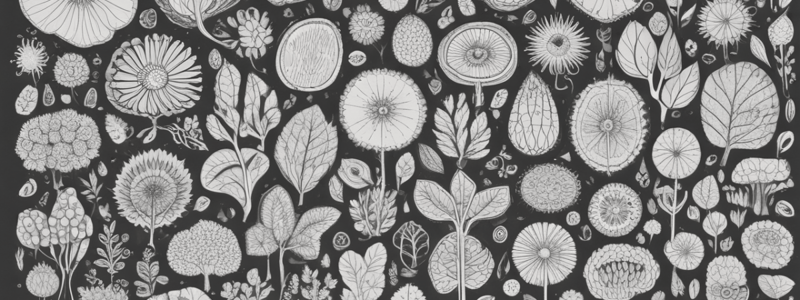Podcast
Questions and Answers
What is the main function of parenchyma cells in plant tissues?
What is the main function of parenchyma cells in plant tissues?
- Providing mechanical support
- Supporting the plant's structure
- Storing food and conducting photosynthesis (correct)
- Conducting water and minerals
Which type of muscle tissue is found in the heart?
Which type of muscle tissue is found in the heart?
- Smooth muscle
- Voluntary muscle
- Skeletal muscle
- Cardiac muscle (correct)
What is the main function of xylem tissues in plants?
What is the main function of xylem tissues in plants?
- Storing food
- Conducting sugars
- Providing mechanical support
- Conducting water and minerals (correct)
What is the main function of collenchyma cells in plant tissues?
What is the main function of collenchyma cells in plant tissues?
What is the main function of glial cells in nervous tissue?
What is the main function of glial cells in nervous tissue?
What is the main function of squamous epithelium?
What is the main function of squamous epithelium?
What is the main function of phloem tissues in plants?
What is the main function of phloem tissues in plants?
What is the main function of transitional epithelium?
What is the main function of transitional epithelium?
Flashcards are hidden until you start studying
Study Notes
Plant Tissues
Simple Permanent Tissues
- Parenchyma: Living cells with thin walls, involved in storage, photosynthesis, and secretion.
- Collenchyma: Elongated cells with thickened corners, providing mechanical support and flexibility.
- Sclerenchyma: Dead cells with thick, lignified walls, providing structural support and protection.
Complex Permanent Tissues
- Xylem: Responsible for water and mineral conduction, composed of tracheids, vessels, and xylem parenchyma.
- Phloem: Responsible for sugar conduction, composed of sieve cells, companion cells, and phloem parenchyma.
Animal Tissues
Nervous Tissue
- Neurons: Specialized cells that transmit and process information through electrical and chemical signals.
- Glial cells: Provide support, protection, and maintenance functions for neurons.
Muscle Tissue
- Skeletal muscle: Voluntary muscle that is attached to bones and helps with movement.
- Smooth muscle: Involuntary muscle that is found in the walls of hollow organs and helps with contraction and relaxation.
- Cardiac muscle: Involuntary muscle that is found in the heart and helps with heart function.
Epithelial Tissue
- Functions: Protection, secretion, absorption, and sensation.
- Types:
- Squamous epithelium: Thin, flat cells for protection and diffusion.
- Cuboidal epithelium: Cube-shaped cells for secretion and absorption.
- Columnar epithelium: Tall, column-shaped cells for protection and secretion.
- Transitional epithelium: Specialized cells that can stretch and return to their original shape.
Plant Tissues
Simple Permanent Tissues
- Parenchyma cells are living, with thin walls, and are involved in storage, photosynthesis, and secretion.
- Collenchyma cells are elongated, with thickened corners, providing mechanical support and flexibility.
- Sclerenchyma cells are dead, with thick, lignified walls, providing structural support and protection.
Complex Permanent Tissues
- Xylem tissue is responsible for water and mineral conduction, comprising tracheids, vessels, and xylem parenchyma.
- Phloem tissue is responsible for sugar conduction, comprising sieve cells, companion cells, and phloem parenchyma.
Animal Tissues
Nervous Tissue
- Neurons are specialized cells that transmit and process information through electrical and chemical signals.
- Glial cells provide support, protection, and maintenance functions for neurons.
Muscle Tissue
- Skeletal muscle is voluntary, attached to bones, and helps with movement.
- Smooth muscle is involuntary, found in hollow organs, and helps with contraction and relaxation.
- Cardiac muscle is involuntary, found in the heart, and helps with heart function.
Epithelial Tissue
- Epithelial tissue has functions including protection, secretion, absorption, and sensation.
- There are four main types of epithelial tissue:
- Squamous epithelium: thin, flat cells for protection and diffusion.
- Cuboidal epithelium: cube-shaped cells for secretion and absorption.
- Columnar epithelium: tall, column-shaped cells for protection and secretion.
- Transitional epithelium: specialized cells that can stretch and return to their original shape.
Studying That Suits You
Use AI to generate personalized quizzes and flashcards to suit your learning preferences.




